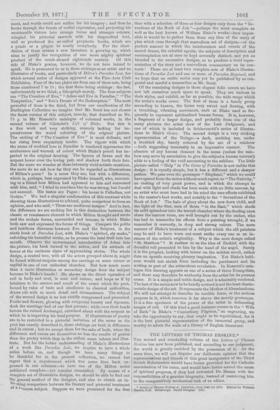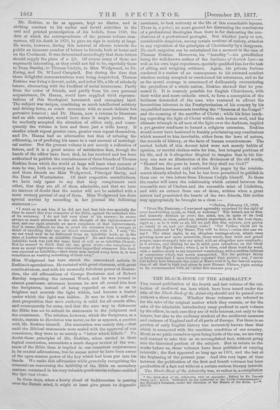THE LETTERS OF THOMAS ERSKINE.*
THE second and concluding volume of the Letters of Thomas Erskine has now been published, and according to our judgment, the world is greatly enriched by the possession of it. At the same time, we will not disguise our deliberate opinion that the representatives and friends of this great inaugurator of the Third Scotch Reformation would have better provided for the Catholic• canonisation of his name, and would have better served the cause of spiritual progress, if they had entrusted Dr. Hanna with the responsibilities of a genuine biography, instead of restricting him to the comparatively mechanical task of an editor.
* Leiters of Thomas Erskine of Lightmen „front 1880 tilt 1870. Edltod by William Hanna, D.D. Edinburgh: David Douglas. 1877. Mr. Erskine, so far as appears, kept no diaries, and in striking contrast to his earlier and fervid activities in the oral and printed promulgation of his beliefs, from 1840, the date at which the correspondence of the present volume com- mences, till his death in 1870, he gave no sign to society at large. He wrote, however, during this interval of silence towards the public an immense number of letters to friends, both at home and on the Continent. It was determined accordingly that these letters should supply the place of a life. Of course many of these are supremely interesting, as they could not fail to be, especially those to Dean Stanley, to Thomas Carlyle, to Miss Wedgwood, to Dr. Ewing, and Dr. M'Leod Campbell. But during the time that these delightful communications were being despatched, Thomas Erskine was living a devout, noble, and sober life, a life of scholarly (leisure, alternating with the kindliest of social intercourse. Partly from the notes of friends, and partly from his own personal -acquaintance, Dr. Hanna, could have supplied vivid represen- tations of this theological heresiarch and exemplary laird. 'The subject was unique, combining so much intellectual subtlety -and driving force, so much reverence with so much delicate but pervasive humour ; and Dr. Hanna, now a veteran in literature and an able narrator, would have done it ample justice. But he modestly accepted the situation of editor only, and conse- quently the volume is here and there just a trifle heavy. If .smaller minds repeat greater ones, greater ones repeat themselves, and Dr. Hanna had no alternative but that of refusing the -editorship, or of prefixing his name to a vast amount of tautologi- cal matter. But the present volume is not merely a collection of letters, and it is a great source of satisfaction that, though the hands of the editor have been tied, he has received and has been authorised to publish the reminiscences of three friends of Thomas Erskine from which the world at large will learn what manner of man he was, both in society and in the retirement of Linlathen ; and these friends are Miss Wedgwood, Principal Shairp, and the Dean of Westminster. Of their respective contributions, we have only space to say that they complement each other, that they are all of them admirable, and that we have no manner of doubt that the reader will not be satisfied with a mere cursory perusal of any of them. Miss Wedgwood has done
special service by recording in her journal the following .sentences
I went on to ask him if ho did not fool that this was specially the time to assert this true character of the Bible, against the mistaken idea of its accuracy. I do not feel very clear of his answer ; ho seems Always so much attracted to the one thought of the righteousness of God, and our right attitude as more recipients of that righteousness, that it seems difficult for him to avert his attention from it enough to think of anything that has no direct connection with it. I said, Do we not want now to be delivered from an infallible book, as in the time of Luther from an infallible Church ?' He said that certainly an infallible book was just the same kind of evil as an infallible Church. But he seemed to think that his ono groat truth—the rocipiency of man as moral rightness—was tionaowhat imperilled whenever this book was rejected as infallible,—that when men turned away from it, it was sometimes as wanting something of their own."
Miss Wedgwood has here struck the unresolved nebula in Erskine's speculations. He restated with great clearness, with great conclusiveness, and with his unusually felicitous power of illustra- tion, the old affirmations of George Buchanan and of Robert Barclay respecting the internal Word, and he was roused to almost passionate utterance because he saw all round him how the Scriptures, instead of being regarded as sent to us to brighten and nourish the light within, had become a bushel under which the light was hidden. It was to him a self-evi- dent proposition that mere authority is valid for all creeds alike, and consequently for none, and that the sure way to dishonour the Bible was not to submit its statements to the judgment and the conscience. The relation, however, which the Scriptures, as a whole, sustain to Revelation was never, so far as appears, a question with Mr. Erskine himself. His contention was mainly this,—that until the Biblical statements were sealed with the approval of our conscience, they were to us merely a "letter which killeth." No -doubt these principles of Mr. Erskine, when carried to their logical conclusion, necessitate a much deeper review of the con- tents of the Bible than is implied in our conscious acquiescence in its central affirmations, but he seems never to have been aware of the open-sesame power of the key which had been put into his hands. We make this affirmation while gratefully recognising the -concessions concerning the fallibility of the Bible on secondary matters contained in his very valuable posthumous volume entitled the Spir:tual Order.
In these days, when a heavy cloud of. Sadduceeism is passing over the British mind, it might at least give pause to dogmatic
nescience, to look seriously at the life of this remarkable layman. There is, a priori, no more ground for distrusting the conclusions of a professional theologian than there is for distrusting the con- clusions of a professional geologist. But whether justly or not, considerable suspicion, among certain sections of society, attaches to any exposition of the principles of Christianity by a clergyman. No such suspicion can be entertained for a moment in the case of Thomas Erskine. Moreover, his " heredity "—his grandfather being the well-known author of the institutes of Scottish Law—as well as his own legal experience, specially qualified him for the task of sifting and weighing evidence. Again, his private fortune rendered it a matter of no consequence to his outward comfort whether society accepted or condemned his utterances, and so far as the moral courage is concerned of deliberately encountering the prejudices of a whole nation, Erskine showed that he pos- sessed it. It is scarcely possible for English Churchmen, with their wider and more catholic creed, to form a conception of the boldness demanded of the man who ventured to affront the favouritism inherent in the Presbyterianism of his country by his unqualified announcements touching the "freeness of the Gospel" and the meaning of the sacrifice of Christ ; while his later teach- ing regarding the light of Christ within each human soul, and the ultimate triumph in all men of the light over the darkness, implied a yet greater readiness to hazard a religious ostracism. Erskine would never have hesitated in frankly proclaiming any conclusions which seemed to him inevitable, either from the laws of nature, the records of history, or the facts of human consciousness. The rooted beliefs of this devout laird were not merely habits of opinion, or mental clothes-suits for him, but integral portions of his life, and is it altogether illogical to imagine that in his his- tory one sees an illustration of the divineness of the old words, "Blessed are the pure in heart, for they shall see God ?"
Dr. Hanna has not only enlivened his pages by the reminis- cences already alluded to, but he has been permitted to publish in them one or two letters from Thomas Carlyle himself. In these the reader will learn the relationship which existed between the venerable seer of Chelsea and the venerable saint of Linlathen, and with an extract from one of these, written when a great sorrow had penetrated the hearts of the two friends, this notice may appropriately be brought to a close :-
" Chelsea, February 12, 1809. " DEAR M. ERSICIITA—I was most agreeably surprised by the sight of your handwriting again, so kind, so welcome The letters are as firm and honestly distinct as over; the mind, too, in spite of its frail environments, as clear, plumb-up, calmly expectant, as in the best days; right so ; so bo it with us all, till we quit this dim sojourn, now grown so lonely to us, and our change come I Our Father, which art in heaven, hallowed be Thy Name, Thy will bo done,'—what else can wo say ? The other night, in my sleepless tossings-about, which were growing more and more miserable, those words, that brief and grand prayer, came strangely into my mind, with an altogether new emphasis ; as if written, and shining for me in mild, pare splendour, on the black bosom of the Night there ; when I, as it were, read thorn word by word, with a sudden check to my imperfect wanderings, with a sudden softness of composure which was much unexpected. Not for perhaps thirty or forty years had I once formally repeated that prayer ; nay, I never felt before how intensely the voice of Man's soul it is the inmost aspira- tion of all that is high and pious in poor Human Nature, right worthy to be recommended with an ' After this manner pray ye,' "







































 Previous page
Previous page